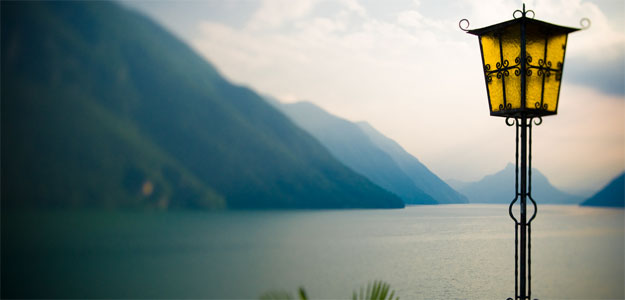
What Is A Eutrophic Lake?
 Though much ink has been spilled over the threat to our oceans from pollutants, rising sea levels, and coral death, less
attention has been directed toward those bodies of water that often lie closer to home. The world's lakes are critical for maintaining
important ecological balances, yet they are often the first to suffer when ecosystems suffer. The science behind them helps us
to understand just how important they really are. (Photo Courtesy of Laurent SJ/Flickr)
Though much ink has been spilled over the threat to our oceans from pollutants, rising sea levels, and coral death, less
attention has been directed toward those bodies of water that often lie closer to home. The world's lakes are critical for maintaining
important ecological balances, yet they are often the first to suffer when ecosystems suffer. The science behind them helps us
to understand just how important they really are. (Photo Courtesy of Laurent SJ/Flickr)
By Dr. Oscar Ravera
Lakes become continuously enriched over time with mineral substances and organic matter from their watershed and the atmosphere. This evolution, called eutrophication, is a slow process in nature, but may be greatly accelerated by human influence.
Whereas the time required to eutrophicate a middle sized lake is some thousands of years, human influence (e.g. pollution) may reduce the time to a few years. Eutrophication due to anthropogenic (human) activities is called "cultural eutrophication". The most important nutrient sources deriving from man are sewage, agricultural practices and some industrial activities (e.g. food production). The load of matter from the watershed to the lake contains phosphorus and nitrogen compounds, which are the most important nutrients for aquatic plants. As a consequence, an increase in the nutrient load causes an acceleration in plant production, leading to an increase in the animals which depend directly (herbivores) or indirectly (carnivores) on these plants for food. In eutrophic lakes the mineralization rate of organic matter cannot balance its production by plants. Thus the concentration of organic matter increases in the lake, with most of it being accumulated in the sediments. These processes profoundly affect the physical, chemical and biological characteristics of the lake as it evolves through the successive stages of oligotrophy, mesotrophy and eutrophy: in other words, from a lake which is very poor in nutrients (oligotrophic) to a lake which is too rich in nutrients (eutrophic).
The detrimental consequences of eutrophication can include:
-The living community can be changed through the decline of some species and the increase of other, more resistant species.
-Algal blooms may clog the filters of waste water treatment plans and the gills of fish and mussels. The mineralization of algal biomass may lead to oxygen depletion. In addition, some algal species are toxic to man and cattle.
-In eutrophic lakes the total fish yield increases, due to an increase in Cyprinids, which have a lower commercial value than that of Salmonids, which decline.
-The frequency of pathogenic microorganisms in the water is generally due to domestic effluents.
- The cost of supplying drinking water increases.
- The deterioration of the organoleptic characteristics of the water (smell, taste, transparency), along with algal blooms, are the principal causes of the decline in tourism in several lake areas.
Lake Lugano is situated on the border between Northern Italy and Switzerland (Canton Ticino) at an altitude of 271 meters asl. Lake Lugano used to be oligotrophic, but "cultural eutrophication" became clear after the Second World War. Research that we carried out from 1972 to 1980 showed that the lake was so eutrophic that it could be included among the most eutrophic lakes in the Alpine area. The most important source of nutrients, and phosphorus in particular, is the load of domestic waste water, a result of the rapid increase in the human population in the lake?s watershed since the Second World War.
The most striking effects of the nutrient enrichment were the following: a decrease in deep-water oxygen and an increase in oxygen in the surface layers, the high frequency of algal blooms, the frequent mass mortality of fish, generally low water transparency, and the profound modification of the biota community.
Waste water treatment started in 1976; since then most of the effluents discharged into Lake Lugano have been diverted to the treatment plants and treated according to a programme which also included the removal of phosphorus by precipitation with aluminium and iron compounds. Up to 1980 this treatment had not yet produced visible results. Since 1980 research on Lake Lugano has been carried out by the Ufficio Protezione e Depurazione Acque (the Department for Water Protection and Treatment) of Canton Ticino (Switzerland). Although Lake Lugano is still eutrophic, some improvement has been seen.
Dr. Oscar Ravera is recognized as a pioneer in freshwater ecological science in Italy, where he acts as a UNESCO advisor on Venice's lagoons and a director of the European Community's 18-nation panel on alpine lakes and eutrophication. He is a United Nations Environmental Program Global 500 Laureate.


